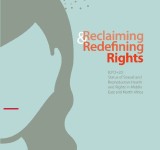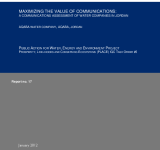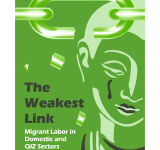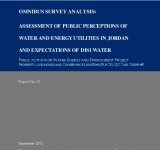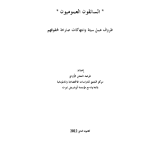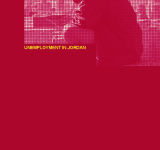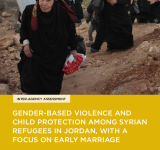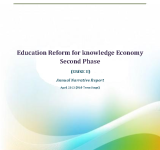service
The report is based on the study designed to conduct a communications assessment of Aqaba Water Company;; one of the key water utilities in Jordan and to examine how its communications department collaborates with other areas of the organization. As part of the Public Action for Water;; Energy and Environment Project (PAP);; a public education and behavior change communication program developed to support USAID’s technical and policy investments in the Jordanian water and energy sectors;; the report finds that the effective communications can save the utility money by improving operations;; increasing efficiencies and reducing customer complaints. The report suggests that the strategic communications can be the key to a sustainable future for the kingdom during the times of critical resource constraints and presents some guiding principles and recommendations for the Aqaba Water Company’s communication efforts.
This report is the second annual report of Tamkeen Center for Legal Aid and Human Rights. It addresses the status of both migrant domestic workers and migrant workers in Qualified Industrial Zones because these two categories are subject to recurrent abuses and are the most vulnerable group due to legislative reasons;; administrative practices and the actions of their employers.
The report aims to determine public attitudes towards water and energy utilities and assess public perception of Disi water;; scheduled to begin serving Amman residents in 2012. It is based on an omnibus survey;; structured;; quantitative and in-person interviews with 1000 respondents representing adult males and females across the twelve governorates of Jordan. This research is part of the was conducted as part of the Public Action in Water;; Energy;; and Environmental Project to initiate and establish clear and identifiable behavioral changes amongst the Jordanian public and decision-makers;; to lead to increased efficiency in the use of water and energy;; and to improve solid waste handling practices. The findings of the survey show that while a majority of respondents could correctly identify their water provider;; nearly a quarter could not and more than half of the respondents believe they are paying water rates that are unreasonable for the quality of water service they receive. The report confirm that the customer experience with both water and electrical utility companies can be improved and increasing awareness of the sound quality of the Disi water would support the public perceptions to continue to shift in a positive direction.
لقد تم إعداد هذا التقرير الخامس حول أوضاع مراكز الإصلاح والتأهيل من اجل تقييم هذه المراكز والنزلاء واماكن التوقيف والموقوفين;; وكما يكشف التقرير عن مواطن الضعف والخلل التي تعاني منها هذه المرافق. وتم الاستناد على منهجية الزيارات الميدانية الفجائية إلى تلك الاماكن;; والالتقاء بالنزلاء والموقوفين;; وكما استند التقرير أيضاً على الالتقاء بنزلاء وموقوفين سابقين وأسر بعض النزلاء الحاليين ونشطاء من المجتمع المدني.
This pilot study report was initiated by the European Training Foundation (ETF);; in close cooperation with the National Center for Human Resources Development (NCHRD) in Jordan;; in the framework of the ETF multiannual project Observatory Function Development in Jordan. The focus of this report is unemployment. However;; considering that unemployment information in itself should not be used or analysed in isolation from other indicators or data;; the report begins by providing an overview of the general labour market situation in Jordan. After the main data on employment by sector;; age;; gender and level of education are presented;; on the basis of the available information;; the specific cases of non-Jordanian employees and employment in the informal economy are highlighted as topics requiring special attention in the Jordanian labour market. In conclusion;; two groups of recommendations are proposed: (i) technical recommendations to main information providers for improving the quality of the information collected;; and (ii) a set of policy recommendations for tackling unemployment. These recommendations are intended to support policymakers in their commitment and willingness to adapt both the formal and informal education and training system and the whole labour market in Jordan.
The report aims to address the particular needs and cultural dynamics of Syrian refugees residing in Jordan;; especially with regards gender-based violence and child protection issues. It presents a comprehensive range of perspectives from urban Syrian refugees and local Jordanian decision makers in government;; community-based organizations and the religious and education sectors. The assessment of this report is based on data collected through three methodologies including questionnaire survey to refugees outside the Za’atari refugee camp;; focus group discussions in regions across Jordan and in-depth interviews. Key findings of the report are 1. The rates of early marriage are high;; 2. A significant percentage of children contribute to the household’s income and 3. Restrictions on women and girls’ mobility constrain their participation in social and economic activities and access to basic services. The report recommends measures to prevent acts of sexual exploitation and abuse and ensure the needs of the most vulnerable members of the Syrian refugee population in the cities.
The second phase of the Program Education Reform for the Knowledge Economy Program (ERfKE II) continues to build on the achievements of the first phase and follow the same implementation arrangements that have proven to be successful in (ERfKE I);; and in the same time;; focuses on schools as the locus of change as well as on the need to enhance capacity building at the central and field levels. The development objective of (ERfKE II) is to provide students enrolled in pre-tertiary education institutions in Jordan with increased levels of skills to participate in knowledge economy. Also the Mid-Term review highlighted the concrete progress achieved by (ERfKE II) in several key areas related to policy development;; quality of education interventions and school construction;; and identified the key issues as a summary of the overall progress that will be tackled and addressed during the remaining stage of implementation.
